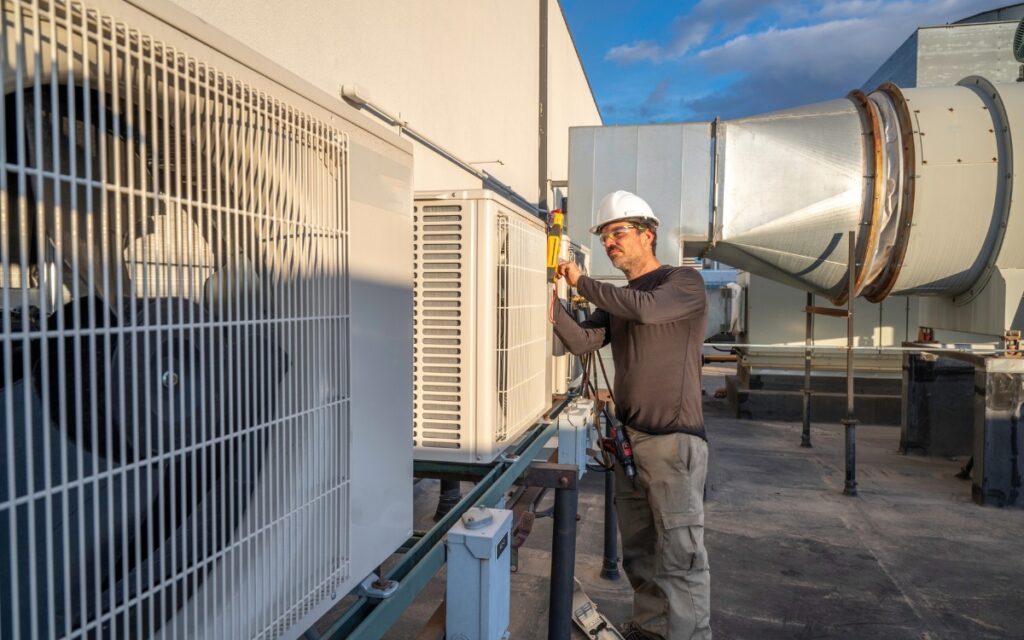The HVAC industry, short for Heating, Ventilation, and Air Conditioning, is all about making our living and working environments comfortable and safe. It involves the design, installation, maintenance, and repair of heating, cooling, and ventilation systems in buildings – from residential homes to commercial spaces, and even large industrial complexes.
HVAC systems are vital in all kinds of buildings, and as long as we need indoor climate control, we’ll need HVAC professionals. It’s a field that isn’t likely to be outsourced or automated, providing solid job security.
Besides, with climate change leading to more extreme temperatures, the demand for HVAC services is on the rise. And the constant evolution of HVAC technologies keeps the industry dynamic and in need of skilled workers.
Getting Education for the HVAC industry
So you’re keen on diving into the world of HVAC, right? But before you start fixing up ACs or installing heaters, there are a few steps you gotta climb. Don’t worry, it’s not as daunting as it seems.

1. High School or GED: Get through high school, with extra points for acing subjects like math, physics, and anything hands-on. This sets a good base for your future HVAC stardom. Of course, it sounds like a big challenge, so you might need some help. When personally I was burdened with assignments, I asked professionals.
2. Trade School or Community College: This is where things heat up (no pun intended). HVAC programs at these schools usually last from six months to two years, and it’s all about getting your hands dirty while also getting the theory down. You’ll learn all the cool stuff, like how HVAC systems work, the nitty-gritty of refrigeration, and much more.
3. Apprenticeship: Think of this as the ultimate test drive. You get to work under an HVAC pro, learning the ropes, and getting paid while at it. It’s a win-win situation, and it usually lasts between three to five years.
4. Getting Your License: In some places, you need a license before you can officially call yourself an HVAC technician. You’ll have to pass an exam and maybe show some proof of experience or education. But hey, after trade school and an apprenticeship, you’ll be more than ready.
5. Certifications: While they’re not always necessary, certifications can make your resume shine brighter. For instance, if you’ll be working with refrigerants, you’ll need an EPA certification. It’s like a badge of honor in the HVAC world.
6. Never Stop Learning: In the HVAC world, things change pretty quickly. New technologies, smarter systems, you name it. So, always keep learning. Whether it’s through short courses, workshops, or seminars, stay in the know.
Opportunities for Education
There are plenty of chances to learn and grow. Whether you’re just starting out or are a seasoned pro looking to brush up on the latest tech, there’s an educational opportunity waiting for you. Here’s a peek at some of them.
1. Trade Schools: HVAC programs in trade schools are like the ultimate starter pack. You get a mix of theory and practical training in stuff like system design, electrical components, and installation methods. These usually last between six months to two years.
2. Community College: If you’re keen on adding a bit more academic flavor to your HVAC journey, community colleges offer Associate Degrees in HVAC technology. It’s more in-depth than trade school and can delve into topics like engineering and energy management.
3. Apprenticeships: Imagine being an HVAC Padawan, learning from your Jedi Master! That’s apprenticeships for you. You’ll get on-the-job training from an experienced tech, and you also get paid. It’s typically a three to five-year commitment.
4. Online Courses: If hitting the books in a traditional classroom isn’t your thing, or you’ve got other commitments, online courses are a godsend. They offer flexibility, and you can learn at your own pace. They cover everything from basics to advanced topics.
5. Manufacturer Training: Many HVAC equipment manufacturers offer specialized training on their products. It’s a great way to become an expert on specific systems.
6. Certifications: Although not mandatory (except for handling refrigerants), getting certified can make you stand out in the crowd. Organizations like North American Technician Excellence (NATE) offer certification programs to validate your knowledge and skills.
7. Continuing Education: The HVAC industry is a fast-evolving beast. Regularly participating in workshops, seminars, or short courses can help you keep up with the latest trends and technologies.
Challenges You Might Face
Diving into the HVAC world can be super exciting, but it’s not without its challenges. It’s not all about fixing a radiator or installing an AC. Here’s a sneak peek at some of the bumps you might hit along the road.
1. The Learning Curve: HVAC systems can be complex, and getting your head around the technicalities can take some time. If physics and math aren’t your favorite subjects, the learning curve might feel a bit steep at first.
2. Staying Updated: HVAC tech is evolving quicker than the latest iPhone. Every day there’s a new gadget or a more efficient system hitting the market. Keeping up with these changes while handling your regular coursework or job can be a bit of a juggling act.
3. Hands-On Training: Sure, reading about an HVAC system is great, but getting your hands dirty is where the real learning happens. Finding good apprenticeship or practical training opportunities might be a challenge, especially in areas where such programs are scarce.
4. Certification Exams: Some certifications require you to pass an exam, and let’s be honest, exams can be nerve-wracking. It’s not just about knowing your stuff; it’s also about test-taking strategies and dealing with exam jitters.
5. Time Management: If you’re doing an apprenticeship, it means working a job and learning at the same time. This can be a bit heavy on the schedule, and you’ll need to master the art of time management.
6. Physical Demands: HVAC work can be physically demanding. You might need to work in tight spaces or handle heavy equipment. It’s not a deal-breaker, but something to consider when getting into the field.






